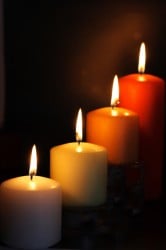 Not every child is emotionally equipped to attend a funeral, and not every funeral is welcoming to attendees under a certain age. The decision of whether or not to bring kids to a funeral has long been a source of contention within families, and there is no easy answer regarding whether or not it’s acceptable. In almost all cases, it comes down to the child’s age, the child’s relationship to the deceased, and the wishes of the family.
Not every child is emotionally equipped to attend a funeral, and not every funeral is welcoming to attendees under a certain age. The decision of whether or not to bring kids to a funeral has long been a source of contention within families, and there is no easy answer regarding whether or not it’s acceptable. In almost all cases, it comes down to the child’s age, the child’s relationship to the deceased, and the wishes of the family.
Posts Tagged ‘grief’
Kids and Death: Alternatives to a Funeral
Tuesday, September 2nd, 2014Common Funeral Planning Mistakes
Wednesday, August 20th, 2014 Funeral planning is never an easy task, especially since it’s something few people are trained for (and because it’s something you hopefully don’t have to practice very often). Being caught unaware of the correct protocol is one of the easiest ways to overpay or get taken advantage of, which is why it’s a good idea to become familiar with the biggest funeral planning pitfalls ahead of time. (more…)
Funeral planning is never an easy task, especially since it’s something few people are trained for (and because it’s something you hopefully don’t have to practice very often). Being caught unaware of the correct protocol is one of the easiest ways to overpay or get taken advantage of, which is why it’s a good idea to become familiar with the biggest funeral planning pitfalls ahead of time. (more…)
Common Funeral Planning Mistakes
Monday, July 7th, 2014 Funeral planning is never an easy task, especially since it’s something few people are trained for (and because it’s something you hopefully don’t have to practice very often). Being caught unaware of the correct protocol is one of the easiest ways to overpay or get taken advantage of, which is why it’s a good idea to become familiar with the biggest funeral planning pitfalls ahead of time.
Funeral planning is never an easy task, especially since it’s something few people are trained for (and because it’s something you hopefully don’t have to practice very often). Being caught unaware of the correct protocol is one of the easiest ways to overpay or get taken advantage of, which is why it’s a good idea to become familiar with the biggest funeral planning pitfalls ahead of time.
- Waiting until the Last Minute: Don’t wait until a terminal illness or catastrophe brings funeral planning to the forefront. The best funeral plans are made when you and your loved ones are in good health and are able to make calm, rational decisions with plenty of time to think them over.
- Going with the First Funeral Home You Come Across: You may get a recommendation from a hospital or hospice. You might call the first funeral home you see in the phone book. You could even stick to the same funeral home you used the last time a death occurred. While these are great ways to find a funeral home, be sure and call around for additional (more…)
Managing Grief around the Holidays
Monday, February 24th, 2014 If you’ve done any funeral planning this past year or buried a loved one, the holidays are going to be a difficult time. No matter how well you might be handling your grief, there’s something about the holiday season that tends to throw people into a tailspin of bereavement. Memories tend to rise up in a big way, and it can be difficult amid all the hustle and bustle of good cheer to find the support you need to make it through.
If you’ve done any funeral planning this past year or buried a loved one, the holidays are going to be a difficult time. No matter how well you might be handling your grief, there’s something about the holiday season that tends to throw people into a tailspin of bereavement. Memories tend to rise up in a big way, and it can be difficult amid all the hustle and bustle of good cheer to find the support you need to make it through.
Among well-wishers pushing you to “move on,” the general stress that always arises this time of year, and the spirit of a season meant to bring joy (but which often does the exact opposite), it’s important to carve out a place for your grief.
- Expect a Change in Your Feelings: Maybe you’ve been working through your grief and have come to a kind of acceptance lately. Maybe you’re still incredibly angry and spend part of every day in tears. No matter where you are on your journey, expect there to be a change. Feelings of isolation and loneliness are common this time of year, and it’s a good idea to keep an eye on the warning signs for depression. The important thing is to recognize that ALL feelings are okay, and that the increased intensity of them is only natural around the holidays. (more…)
Writing a Condolence Letter
Tuesday, October 29th, 2013 Most people are familiar with sending sympathy cards upon the passing of a friend or relative, or even with sending funeral flowers or some type of gift basket to show their concern. These types of funeral gifts have become mainstream, allowing individuals from all over the country to participate in the funeral even if they can’t be there in person.
Most people are familiar with sending sympathy cards upon the passing of a friend or relative, or even with sending funeral flowers or some type of gift basket to show their concern. These types of funeral gifts have become mainstream, allowing individuals from all over the country to participate in the funeral even if they can’t be there in person.
One way in which to take this type of sentiment to the next level is to write a condolence letter. So much more than a sympathy card, a heartfelt condolence letter provides a way to reach out to those in need through your words and deepest sentiments. And because this type of letter is meant to be sent on paper through the mail, it tends to mean much more than an email or other online message.
Differences between a Sympathy Card and a Condolence Letter
Sympathy cards are typically short notes that you either purchase or make to let a family know that you are thinking of them. Much like a birthday card or other commemorative item, the sentiment is short and sweet (although these particular ones express sympathy rather than joy).
Grief Tourism
Monday, August 12th, 2013 Most of us are already aware of the appeal of walking through an old cemetery. Rich with history and age, beautiful in terms of scenery, and filled with a sense of serenity that’s hard to capture in our modern world, older cemeteries have a park-like atmosphere that appeals to many different types of people.
Most of us are already aware of the appeal of walking through an old cemetery. Rich with history and age, beautiful in terms of scenery, and filled with a sense of serenity that’s hard to capture in our modern world, older cemeteries have a park-like atmosphere that appeals to many different types of people.
This recent resurgence of interest in visiting cemeteries has led to a phenomenon known as grief tourism. Much less depressing than it actually sounds, grief tourism (also known as dark tourism) is considered any vacation or trip in which visiting cemeteries is the primary objective.
Where Grief Tourism Takes Place
The Pere-Lachaise Cemetery in Paris, which first opened in 1804, receives more than a million and a half visitors a year. (Many of them come to see the grave of Jim Morrison, although there are plenty other celebrities here to catch the eye.) Other popular Paris destinations include Montparnasse Cemetery and Saint-Denis, where many of France’s monarchs have been laid to rest.
How to Find a Bereavement Support Group
Monday, June 17th, 2013 After the funeral planning is finished and the deceased’s remains have been taken care of, one of the top recommendations for the newly bereaved is to find a support group. Although everyone experiences grief differently, there is much to be said for talking through the pain and finding a group of like-minded individuals who can help you cope with your loss.
After the funeral planning is finished and the deceased’s remains have been taken care of, one of the top recommendations for the newly bereaved is to find a support group. Although everyone experiences grief differently, there is much to be said for talking through the pain and finding a group of like-minded individuals who can help you cope with your loss.
Why Bereavement Groups Matter
The loss of a loved one is something no one can prepare for. You never know how it will affect you until it happens, and the overwhelming surge of emotion that results is often more than the average person knows what to do with.
Sympathy Gifts for Men
Tuesday, March 19th, 2013 Most funeral gifts and sympathy offerings are geared toward a female population. Whether due to the natural progression of funeral trends or the fact that many types of comforting gift ideas are feminine in nature, the reality is that funeral gifts geared specifically for men tend to be more difficult to come by.
Most funeral gifts and sympathy offerings are geared toward a female population. Whether due to the natural progression of funeral trends or the fact that many types of comforting gift ideas are feminine in nature, the reality is that funeral gifts geared specifically for men tend to be more difficult to come by.
Grief and Gender
Men and women grieve differently—and there’s no time that this becomes more apparent than following the death of a loved one. As a general rule, women are more likely to reach out to family and friends for support, and to make a physical show of their bereavement. Men, on the other hand, might withdraw or isolate themselves (and their grief), trying to be strong for others.
Making Time for Yourself during Funeral Planning
Tuesday, November 13th, 2012 Funeral planning typically lasts anywhere from three days to two weeks, depending on your religion, your advance planning efforts, and the time (and place) of death. Although funeral homes and medical services have streamlined the way they provide funeral planning options to the public, there is still quite a bit of decision-making and coordination that goes into it, and even the generous end of the timeline can seem like a blur when you’re facing your recent loss.
Funeral planning typically lasts anywhere from three days to two weeks, depending on your religion, your advance planning efforts, and the time (and place) of death. Although funeral homes and medical services have streamlined the way they provide funeral planning options to the public, there is still quite a bit of decision-making and coordination that goes into it, and even the generous end of the timeline can seem like a blur when you’re facing your recent loss.
While everyone grieves differently, it is important to take some time during these funeral planning days to simply unwind—whether that means carving out some time alone or doing an activity you love.
Who Should Be Involved in Planning a Funeral?
Friday, November 9th, 2012 Whenever the subject of funeral planning comes up, the topics almost always revolve around the what, where, and how of the process. What did the deceased wish to have done to his or her remains? Where will the funeral and interment be held? How will everything be paid for?
Whenever the subject of funeral planning comes up, the topics almost always revolve around the what, where, and how of the process. What did the deceased wish to have done to his or her remains? Where will the funeral and interment be held? How will everything be paid for?
One question often overlooked is who. Who is responsible for planning the funeral? While it might seem like there’s a simple answer to that question (the Executor of the estate or next of kin), there are a lot more complex layers involved—especially if the deceased had a large family.


